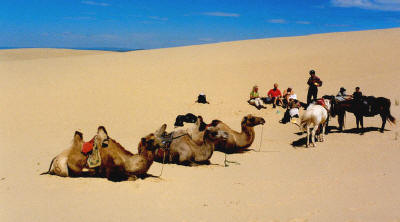|
Surprisingly near the Mongolian capital
Ulaanbaatar, the Gobi gradually begins to appear. We will travel south over vast
steppe lands before meeting our camel herdsmen, who will go with us on this
adventure journey. We provide a private horse for each participant for daily
rides with local horse guide (he does not speak English). Westerners perceive the Gobi as a desert but actually most of
it is a semi desert steppe. We will trek in an area where the steppes give way
to sandy subsoil and in an area where there is a 20 km long sand dune. All
herdsmen lead a traditional way of life here.
 ZZ-MGHKNJ01
ZZ-MGHKNJ01
Included: Guide, breakfast every day, and all meals
outside Ulaanbaatar. All overnights in hotel (2n.) and tents (4n.), private
horse for rides, camping equipment and all local transport.
7 days/6 nights $ 695
Single + 125
Low Season $ 625
Deduct $100 if you do not need a horse for this trip
2008 Dates:
05/10-05/16
05/20-05/26 05/30-06/05
06/09-06/15 06/19-06/25 06/29-07/05
07/13-07/19 07/23-07/29 08/02-08/08
08/12-08/18 08/19-08/25 08/29-09/04
09/08-09/14
Naadaam
Extension
3 days/ 3 nights $695 Single + 175
2008 Dates: 07/10-07/13
Meeting: Ulaanbaatar
Difficulty: Moderate
Excludes: Imported drinks, airport tax on departure, laundry, rent of riding camel, ($25 per camel per day). Air or train tickets in and out of Mongolia. Visa fee.
Note: - groups having less than 7 people will carry no ger (yurt). Just
tents.
- you can join a Yak Trek in Khan Khentii after each of these trips.
Brief Outline Itinerary
On this journey we use low impact traditional modes of transport. Our
equipment will be carried on camel carts, in the same way nomadic herders
transport their belongings, moving from one pasture to another. In this area
camels are being used for this purpose. We will also carry a ger, which is the
traditional felt tent that Mongols live in today. Essentially, it means that we
can use the services of the local people living in the area where we travel.
This kind of a trip is what we have labeled The herdsmen are the experts and we
will be able to get a first hand experience of how to move a camp the
traditional Mongolian way.
Day 01: Ulaanbaatar
Arrive in the Mongolian capital by train or air. Transfer to the hotel.
Day 02: Drive south
A.m. Drive to the south over the treeless steppes. In the afternoon we reach
Semjit Hairhan, some giant rock formations visibly standing up straight from the
surrounding steppe. Here we meet with the camel herdsmen. Put up camp on the
steppe. Scan the ridges of the surrounding hills and rocks for Argali Sheep (Ovis
ammon), the largest wild sheep in the world. All wildlife viewing requires a
great portion of luck. Overnight in tents.
Day 03-05, [JW1] : Camel trek
We will trek for a two full days across the treeless steppes meeting nomadic
herdsmen families on the way. Our hosts in the area are relatives to one third
of the local population. During the last day we will trek through Arburd Sands,
a 20km long sand dune. Strange enough, a good number wolves - being wary of man
- have taken refuge in these dunes and can sometimes be seen. We have brought
one ger (yurt) that will be our mobile restaurant. Tents, all provisions and a
cook are provided. All equipment will be loaded on to camel carts. There will be
one or two riding camels so that we can try some riding as well. Herdsmen will
follow the carts. We will make contact with other herdsmen. We will no doubt be
invited into the gers, and learn about their ancient lifestyle. Overnight in
tents and the last night at Arburd Sands Ger Camp.
Day 06: Bogd Khan Mountain
A.m. drive back to Ulaanbaatar. On the way we will visit the Bogd Uul
Biosphere Reserve and the site of the ruins of Manzhir monastery. This is the
southernmost taiga of the area, and we will get up into the hills and some nice
forests. Red deer (Cervuselaphus) can usually be seen here. Back in Ulaanbaatar
check into the hotel. Overnight.
Day 07: Departure
You have the choice to stay another day or two in Ulaanbaatar, transfer out
to your next destination via Beijing. We however recommend that you join our Yak
Trek for one more week of exciting adventure in a contrasting environment of
rivers, steppe valleys, meadows and deep forests.
|
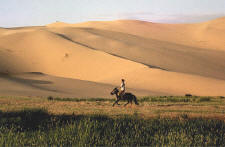
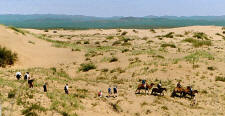
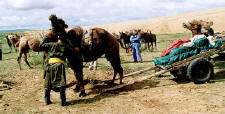
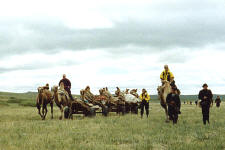
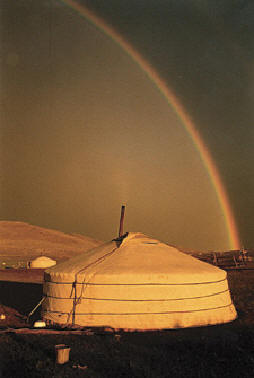
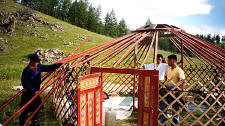
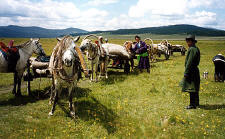
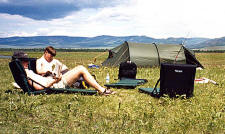
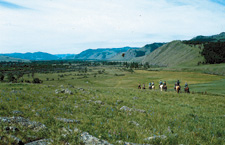
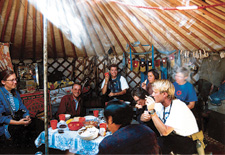
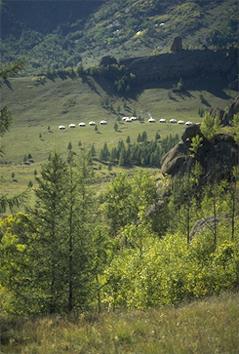
|
|
We have introduced a concept of practical and desirable ways
of travel in Mongolia, which is the synergy of Western and Mongolian ideas
brought about after many years experience of travel all across Mongolia:
Transport: Mongolian families frequently move from one pasture to
another using wooden traditional carts. These are tied to the animals available
in the region. Here we will use camels and horses. The services of some herdsmen
will be hired by the expedition, and they will provide us with their animals.
Staff: A Mongolian leader will accompany the group at all times. For
these groups the service will be in English. Other language interpreters are
available upon request. There will also be an assistant to the cook. In
addition, the services of the local herdsmen will be hired along with their
animals.
Camel riding: If you would like to have your own camel to ride during
the trek, this can be arranged at the time of booking for an additional cost of
USD 25 per day. This cost is payable in Mongolia only. Mongolian camels are
Bactrian (two humped) and easy to ride even without previous experience.
Horses are included on 4 days (unless you prefer to hike). You will be
riding with a local guide (he most likely does not speak English). Mongolian horses are peculiar and horsemanship is
somewhat different among the Mongols as compared to home. We suggest you bring
your own riding hat with you, since none are available in Mongolia.
Meals: Our cook will prepare the meals. We pride ourselves in having
cooks adapt with both western and Mongolian cooking on our trips. There are
always vegetables available, and we have no problem accommodating vegetarians on
our trips. For breakfast we can usually buy fresh yogurt from the herdsmen in
the local area.

|

